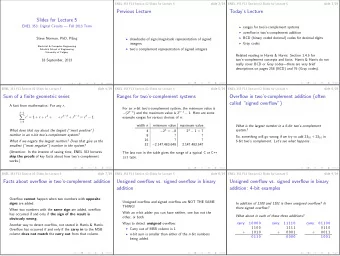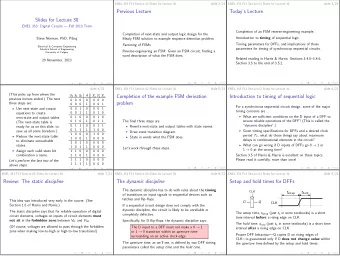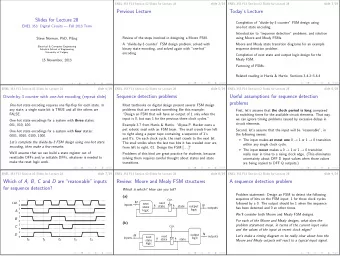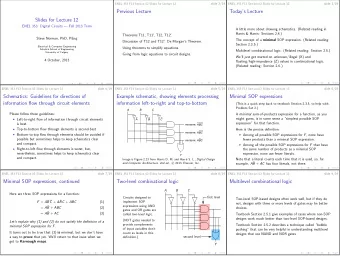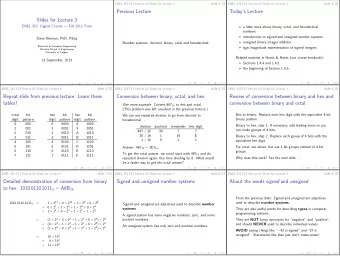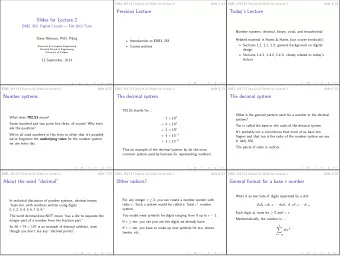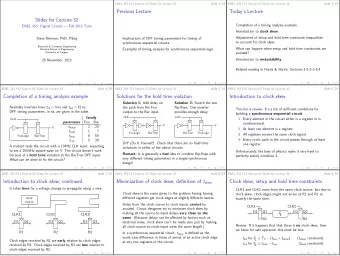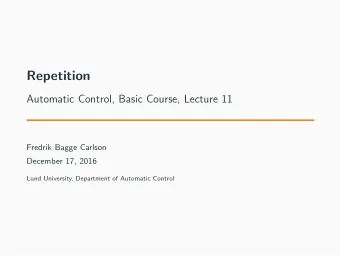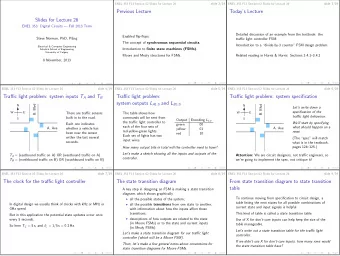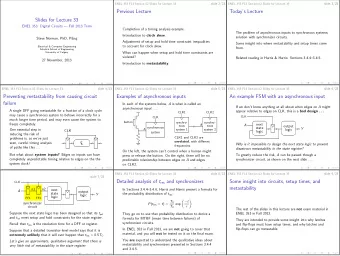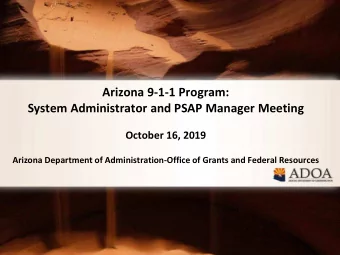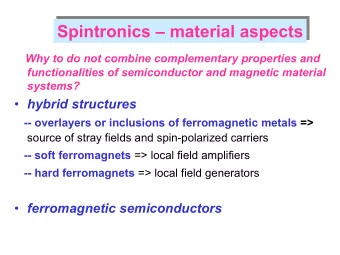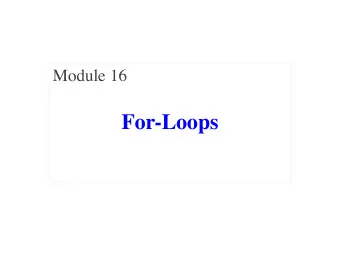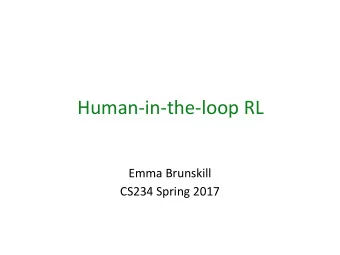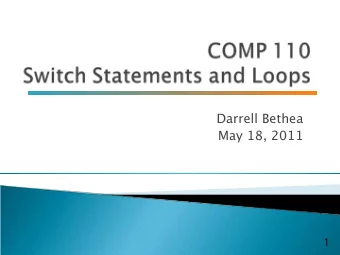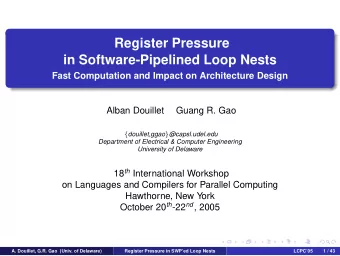
Lecture 8 Announcements 2 Scott B. Baden / CSE 160 / Wi '16 - PowerPoint PPT Presentation
Lecture 8 Announcements 2 Scott B. Baden / CSE 160 / Wi '16 Recapping from last time: Minimal barrier synchronization in odd/even sort Global bool AllDone; for (s = 0; s < MaxIter; s++) { barr.sync(); A if (!TID) AllDone = true;
Lecture 8
Announcements 2 Scott B. Baden / CSE 160 / Wi '16
Recapping from last time: Minimal barrier synchronization in odd/even sort Global bool AllDone; for (s = 0; s < MaxIter; s++) { barr.sync(); A if (!TID) AllDone = true; barr.sync(); B int done = Sweep(Keys, OE, lo, hi); // Odd phase barr.sync(); C done &= Sweep(Keys, 1-OE, lo, hi); // Even phase mtx.lock(); AllDone &= done; mtx.unlock(); barr.sync(); D if (allDone) break; } a i-1 a i a i+1 3 Scott B. Baden / CSE 160 / Wi '16
The barrier between odd and even sweeps int done = Sweep(Keys, OE, lo, hi); barr.sync(); done &= Sweep(Keys, 1-OE, lo, hi); P 0 P 1 P 2 4 Scott B. Baden / CSE 160 / Wi '16
Is it necessary to use a barrier between the odd and even sweeps? A. Yes, there’s no way around it B. No C. We only need ensure that each processor’s neighbors are done int done = Sweep(Keys, OE, lo, hi); D. Not sure barr.sync(); done &= Sweep(Keys, 1-OE, lo, hi); 5 Scott B. Baden / CSE 160 / Wi '16
Today’s lecture • OpenMP 7 Scott B. Baden / CSE 160 / Wi '16
OpenMP • A higher level interface for threads programming http://www.openmp.org • Parallelization via source code annotations • All major compilers support it, including gnu • Gcc 4.8 supports OpenMP version 3.1 https://gcc.gnu.org/wiki/openmp • Compare with explicit threads programing #pragma omp parallel private(i) shared(n) i0 = $TID*n/$nthreads; { i1 = i0 + n/$nthreads; #pragma omp for for (i=i0; i< i1; i++) for(i=0; i < n; i++) work(i); work(i); } 8 Scott B. Baden / CSE 160 / Wi '16
OpenMP’s Fork-Join Model • A program begins life as a single thread • Enter a parallel region, spawning a team of threads • The lexically enclosed program statements execute in parallel by all team members • When we reach the end of the scope… • The team of threads synchronize at a barrier and are disbanded; they enter a wait state • Only the initial thread continues • Thread teams can be created and disbanded many times during program execution, but this can be costly • A clever compiler can avoid many thread creations and joins 9 Scott B. Baden / CSE 160 / Wi '16
Fork join model with loops Seung-Jai Min cout << “Serial\n”; Serial N = 1000; #pragma omp parallel{ #pragma omp for Parallel for (i=0; i<N; i++) A[i] = B[i] + C[i]; #pragma omp single M = A[N/2]; Serial #pragma omp for for (j=0; j<M; j++) Parallel p[j] = q[j] – r[j]; } Serial Cout << “Finish\n”; 10 Scott B. Baden / CSE 160 / Wi '16
Loop parallelization • The translator automatically generates appropriate local loop bounds • Also inserts any needed barriers • We use private/shared clauses to distinguish thread private from global data • Handles irregular problems • Decomposition can be static or dynamic #pragma omp parallel for shared(Keys) private(i) reduction(&:done) for i = OE; i to N-2 by 2 if (Keys[i] > Keys[i+1]) swap Keys[i] ↔ Keys[i+1]; done *= false; } end do return done; 11 Scott B. Baden / CSE 160 / Wi '16
Another way of annotating loops • These are equivalent #pragma omp parallel #pragma omp parallel for { for (int i=1; i< N-1; i++) #pragma omp for a[i] = (b[i+1] – b[i-1])/2h for (int i=1; i< N-1; i++) a[i] = (b[i+1] – b[i-1])/2h } 12 Scott B. Baden / CSE 160 / Wi '16
Variable scoping • Any variables declared outside a parallel region are shared by all threads • Variables declared inside the region are private • Shared & private declarations override defaults, also usefule as documentation int main (int argc, char *argv[]) { double a[N], b[N], c[N]; int i; #pragma omp parallel for shared(a,b,c,N) private(i) for (i=0; i < N; i++) a[i] = b[i] = (double) i; #pragma omp parallel for shared(a,b,c,N) private(i) for (i=0; i<N; i++) c[i] = a[i] + sqrt(b[i]); 13 Scott B. Baden / CSE 160 / Wi '16
Dealing with loop carried dependences • OpenMP will dutifully parallelize a loop when you tell it to, even if doing so “breaks” the correctness of the code int* fib = new int[N]; fib[0] = fib[1] = 1; #pragma omp parallel for num_threads(2) for (i=2; i<N; i++) fib[i] = fib[i-1]+ fib[i-2]; • Sometimes we can restructure an algorithm, as we saw in odd/even sorting • OpenMP may warn you when it is doing something unsafe, but not always 15 Scott B. Baden / CSE 160 / Wi '16
Why dependencies prevent parallelization • Consider the following loops #pragma omp parallel { #pragma omp for nowait for (int i=1; i< N-1; i++) a[i] = (b[i+1] – b[i-1])/2h #pragma omp for for (int i=N-2; i>0; i--) b[i] = (a[i+1] – a[i-1])/2h } • Why aren’t the results incorrect? 16 Scott B. Baden / CSE 160 / Wi '16
Why dependencies prevent parallelization • Consider the following loops #pragma omp parallel {#pragma omp for nowait fo for (in int i=1; =1; i< < N-1; N-1; i++) ++) a[ a[i] = (b[i+1] – – b[i-1])/2h #pragma omp for fo for (in int N N-2; 2; i>0; >0; i--) --) b[ b[i] = (a[i+1] – – a[i-1])/2h } • Results will be incorrect because the array a[ ] , in loop #2 , depends on the outcome of loop #1 (a true dependence ) � We don’t know when the threads finish � OpenMP doesn’t define the order that the loop iterations wil be incorrect 17 Scott B. Baden / CSE 160 / Wi '16
Barrier Synchronization in OpenMP • To deal with true- and anti-dependences, OpenMP inserts a barrier (by default) between loops: for (int i=0; i< N-1; i++) a[i] = (b[i+1] – b[i-1])/2h BARRIER for (int i=N-1; i>=0; i--) b[i] = (a[i+1] –a[i-1])/2h • No thread may pass the barrier until all have arrived hence loop 2 may not write into b until loop 1 has finished reading the old values • Do we need the barrier in this case? Yes for (int i=0; i< N-1; i++) a[i] = (b[i+1] – b[i-1])/2h BARRIER? for (int i=N-1; i>=0; i--) c[i] = a[i]/2; 18 Scott B. Baden / CSE 160 / Wi '16
Which loops can OpenMP parallellize, assuming there is a barrier before the start of the loop? A. 1 & 2 B. 1 & 3 C. 3 & 4 D. 2 & 4 All arrays have at least N elements E. All the loops 3. for i = 0 to N-1 step 2 1. for i = 1 to N-1 A[i] = A[i-1] + A[i]; A[i] = A[i] + B[i-1]; 4. for i = 0 to N-2{ 2. for i = 0 to N-2 A[i] = B[i]; A[i+1] = A[i] + 1; C[i] = A[i] + B[i]; E[i] = C[i+1]; } 19 Scott B. Baden / CSE 160 / Wi '16
How would you parallelize loop 2 by hand? 1. for i = 1 to N-1 A[i] = A[i] + B[i-1]; 2. for i = 0 to N-2 A[i+1] = A[i] + 1; 20 Scott B. Baden / CSE 160 / Wi '16
How would you parallelize loop 2 by hand? for i = 0 to N-2 A[i+1] = A[i] + 1; for i = 0 to N-2 A[i+1] = A[0] + i; 21 Scott B. Baden / CSE 160 / Wi '16
To ensure correctness, where must we remove the nowait clause? A. Between loops 1 and 2 B. Between loops 2 and 3 C. Between both loops D. None #pragma omp parallel for shared(a,b,c) private(i) for (i=0; i<N; i++) c[i] = (double) i #pragma omp parallel for shared(c) private(i) nowait for (i=1; i<N; i+=2) c[i] = c[i] + c[i-1] #pragma omp parallel for shared(c) private(i) nowait for (i=2; i<N; i+=2) c[i] = c[i] + c[i-1] 23 Scott B. Baden / CSE 160 / Wi '16
Exercise: removing data dependencies • How can we split into this loop into 2 loops so that each loop parallelizes, the result it correct? � B initially: 0 1 2 3 4 5 6 7 � B on 1 thread: 7 7 7 7 11 12 13 14 #pragma omp parallel for shared (N,B) for i = 0 to N-1 B[i] += B[N-1-i]; B[0] += B[7], B[1] += B[6], B[2] += B[5] B[3] += B[4], B[4] += B[3], B[5] += B[2] B[6] += B[1], B[7] += B[0] 24 Scott B. Baden / CSE 160 / Wi '16
Splitting a loop • For iterations i=N/2+1 to N, B[N-i] reference newly computed data • All others reference “old” data • B initially: 0 1 2 3 4 5 6 7 • Correct result: 7 7 7 7 11 12 13 14 #pragma omp parallel for … nowait for i = 0 to N-1 for i = 0 to N/2-1 B[i] += B[N-i]; B[i] += B[N-1-i]; for i = N/2+1 to N-1 B[i] += B[N-1-i]; 25 Scott B. Baden / CSE 160 / Wi '16
Reductions in OpenMP • In some applications, we reduce a collection of values down to a single global value � Taking the sum of a list of numbers � Decoding when Odd/Even sort has finished • OpenMP avoids the need for an explicit serial section int Sweep(int *Keys, int N, int OE, ){ bool done = true; #pragma omp parallel for reducti tion(&:done) for (int i = OE; i < N-1; i+=2) { if (Keys[i] > Keys[i+1]){ Keys[i] ↔ Keys[i+1]; done &= false; } } //All threads ‘and’ their done flag into a local variable // and store the accumulated value into the global return done; } 26 Scott B. Baden / CSE 160 / Wi '16
Reductions in OpenMP • In some applications, we reduce a collection of values down to a single value � Taking the sum of a list of numbers � Decoding when Odd/Even sort has finished • OpenMP avoids the need for an explicit serial section int Sweep(int *Keys, int N, int OE, ){ bool done = true; #pragma omp parallel for reducti tion(&:done) for (int i = OE; i < N-1; i+=2) { if (Keys[i] > Keys[i+1]){ Keys[i] ↔ Keys[i+1]; done &= false; } } //All threads ‘and’ their done flag into the local variable return done; } 27 Scott B. Baden / CSE 160 / Wi '16
Recommend
More recommend
Explore More Topics
Stay informed with curated content and fresh updates.




